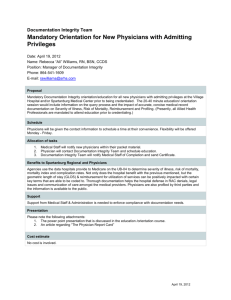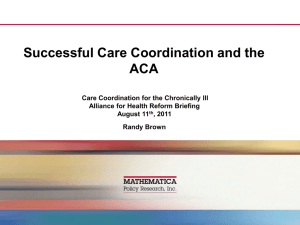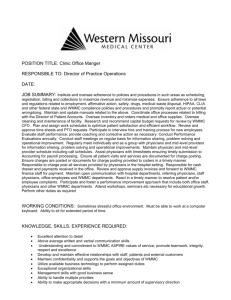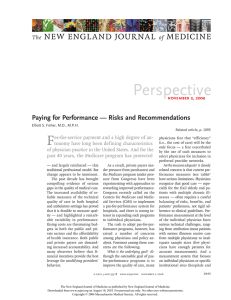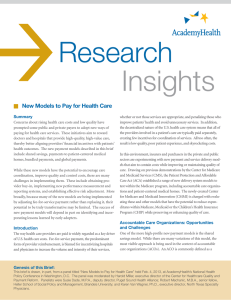Center for Global Health & Diplomacy University of North Florida Jacksonville, Florid
advertisement
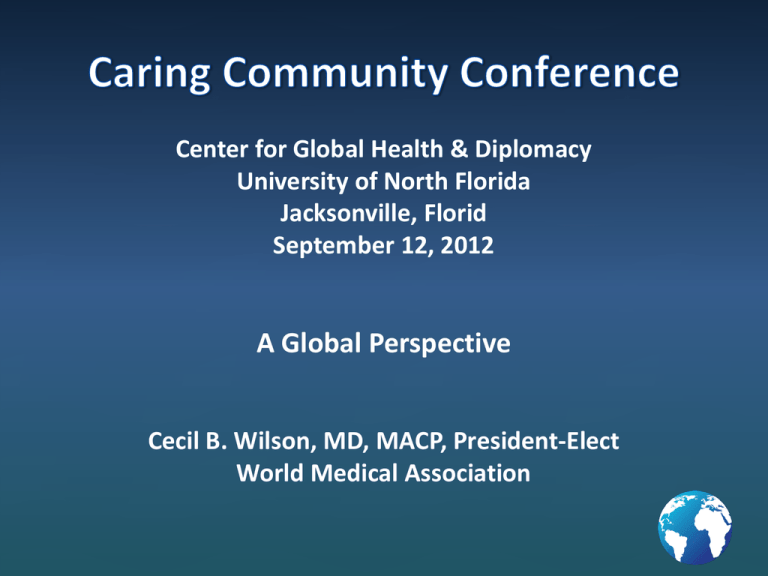
Center for Global Health & Diplomacy University of North Florida Jacksonville, Florid September 12, 2012 A Global Perspective Cecil B. Wilson, MD, MACP, President-Elect World Medical Association Caring, Ethics, Science Global Situation • All systems are on the move • All systems are deeply rooted in cultural ideas about society and values • There is no evidence that one model is better than another, if you do not define what you want to achieve and whom you are willing to trust Global situation (2) • Total inequality • Some countries have systems for care for the population others do not • Currently the rich countries in this world satisfy their need for health professionals by brain drain from poor countries • Health disparities may be a driving force for general migration • Is there a blue print to copy? Strengthening the health workforce A country action Guide In health care thereis a human resource crisis •Source: WHO World Health Report 2006 •Source: WHO World Health Report 2006 Global Migration of Physicians Healthcare Financing 1. 2. 3. 4. 5. 6. 7. General taxation Social health insurance Voluntary or private health insurance Out-of-pocket payments Donations to charities Public-private partnerships Market-based financial transaction taxes Four Basic Systems Worldwide • • • • The Beveridge Model The Bismarck Model The National Health Insurance Model The Out-of Pocket Model Beveridge (gov’t system) • Health care provided and financed by gov’t through tax payments • Hospitals and clinics owned by gov’t • Doctors are gov’t employees – GPs capitation, specialists salary • Co-payments none for most services • Countries – Great Britain, Cuba, Spain, most of Scandinavia and New Zealand Bismarck (private insurance) • Social insurance financed by employers and employees through payroll deduction • Plans cover everyone and are not for profit • Single payment system negotiated by insurers (240) • Doctors and hospitals private • Countries – Germany, France, Belgium, the Netherlands, Japan, Switzerland National Health Insurance • • • • Gov’t run insurance into which everyone pays Single payer Private sector providers Controls costs by limiting medical services they will pay for and making patients wait • Countries – Canada, Taiwan and South Korea Out-of-pocket • Underdeveloped countries with no health care system • The rich get medical care, the poor stay sick or die • Millions of people go their whole lives without seeing a doctor • Access – a village healer, home remedies • Regions – Rural Africa, India, China and Latin America If you are in America • Veterans and native Americans – Britain, Cuba • Employer provided insurance – Germany, France, Japan, Switzerland * • Medicare – Canada, Taiwan, South Korea • Uninsured – Cambodia, rural India * Insurance mandated and not for profit Observations • All systems are on the move • All systems are deeply rooted in cultural ideas about society and values • More important than one or the other feature is a national consensus • It is a question of what values are most important: freedom, choice, social protection, profits 21 Average Health Care Spending per Capita, 1980–2009 Adjusted for differences in cost of living Dollars US 8000 NOR 7000 SWIZ NETH 6000 CAN DEN 5000 GER FR 4000 SWE 3000 UK AUS 2000 NZ JPN 1000 0 1980 1984 1988 1992 1996 2000 2004 2008 THE COMMONWEALTH FUND Source: OECD Health Data 2011 (June 2011). 22 Health Care Spending as a Percentage of GDP, 1980–2009 Percent 18 US NETH 16 FR 14 GER DEN 12 CAN SWIZ 10 NZ 8 SWE UK 6 NOR AUS 4 JPN 2 0 1980 1984 1988 GDP refers to gross domestic product. Source: OECD Health Data 2011 (June 2011). 1992 1996 2000 2004 2008 THE COMMONWEALTH FUND 2011 Economic Impact Survey Office based physicians, Florida * • • • • • • Total office based physicians – 39,432 Total jobs – 230,000 Jobs, average per physician – 5.9 Output - $64.5 billion – 8.6% of FL’s GDP Wages & Benefits - $40 billion Taxes - $2.3 billion state and local * nationally $1.4 trillion economic activity and 4 million jobs The Future 1. Scientific advances will continue to astound, with innovative and creative ways to care for the sick 2. An aging population and an accompanying epidemic of chronic disease 3. Healthcare system changes that emphasize continuity and coordination of care – investments in quality, prevention and wellness 1. Scientific Advances Scientific advances will continue to astound, with innovative and creative ways to care for the sick James Watson Economic Impact Human Genone Project 1988 to 2010 • • • • $5.6 b – Federal Gov’t investment * $796 b – research and industry activity $244 b – personal income 3.8 m – job years of employment In 2010 genomics-based industry generated • $3.7 b – federal taxes • $2.3 b – US state and local taxes Future of Medicine 2. Demographics An aging population and an accompanying epidemic of chronic disease Workforce solutions • National Health Services Corp scholarship and loan repayment programs • Title VII health professions program payment programs • Primary care training • National Commission on Workforce • Grants to adopt patient-Centered Medical Homes, and residency programs at teaching health centers Workforce solutions (2) • 10 percent bonus payments for primary care • Medicaid payments equal to Medicare • Center for Medicare and Medicaid Innovation • Redistribution of unfilled residency positions to primary care and general surgery • States option to enroll patients in primary care medical homes 3. Health System Changes Healthcare system changes that emphasize continuity and coordination of care – investments in quality, prevention and wellness AMA Physician Innovators Physicians Innovator Committee – Formed among doctors active in new models – Members from across medicine – Goals: • Offer physicians resources and information • Improve patient care • Maximize financial stability AMA Guidelines on ACOs Accountable care organizations must: • Be physician-led • Be voluntary for patients and physicians • Include flexible organizational criteria • Offer support for independent and smallpractice physicians • Include antitrust and fraud and abuse reform • Use quality measures driven by physicians Medicare ACOs: A Win • Participating physicians now share in every dollar of cost savings without a threshold • Less burdensome “meaningful use” criteria for electronic health records • Number of required measures cut in half • New application process allows time to prepare • $170 million in advance payments to physicianowned ACOs for start-up costs • Improved antitrust process eliminates burdensome mandatory review The Future 1. Science 2. Demographics 3. Structure Caring, Ethics, Science



